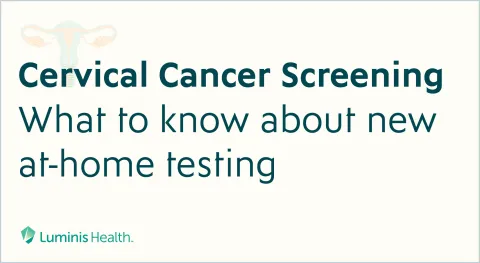September is Prostate Cancer Awareness Month and there’s good reason to take note. According to the American Cancer Society (ACS), prostate cancer is the second most common cancer in American men. And, about one in eight men will be diagnosed with the disease in his lifetime. This year alone, nearly a quarter-million American men will get it and, sadly, more than 34,000 will die from it.
These are scary numbers — and they underscore the importance of screening and finding prostate cancer early when successful treatment is more likely.
About Screening Tests
Prostate screening involves looking for prostate cancer before symptoms are present. We use two main screening tests:
- Digital rectal exam: In this test, a doctor feels the prostate gland for bumps or suspicious areas by inserting a gloved, lubricated finger into the rectum.
- Prostate-specific antigen (PSA) test: A PSA test is a blood test that measures levels of a particular protein produced by normal and cancerous prostate cells. The higher a man’s PSA level, the more likely prostate cancer is present.
The problem with prostate cancer screening tests is they aren’t entirely accurate. Results might suggest you have cancer even when you don’t. On the other hand, a screening test could appear normal when cancer does exist.
When there’s concern about prostate cancer, doctors do a biopsy, which involves removing cells from the gland and looking at them under a microscope to see if they appear abnormal. Unfortunately, biopsies can cause pain, bleeding and infection. They also sometimes lead to:
- Overdiagnosis: There are times when a man might never know he had cancer if he hadn’t had a screening test. Many prostate cancers grow slowly and don’t cause symptoms or threaten a man’s life. Rather than dying of cancer, he’s more likely to die with it. However, once he gets a cancer diagnosis, it can cause stress, anxiety and possibly, overtreatment.
- Overtreatment: When a man knows he has prostate cancer, he wants it treated, even if it’s likely the cancer would never cause problems. Unfortunately, treatment can cause bowel and bladder toxicity and erectile dysfunction, which can negatively — and unnecessarily — affect his quality of life.
Prostate cancer screening recommendations
Different medical organizations, including the U.S. Preventive Services Task Force, the American Urological Association and the American Cancer Society, make recommendations regarding who should be screened and when. And while their recommendations vary slightly, they all generally suggest that men take these steps to safeguard their prostate health:
- Regardless of your age, medical history or risk factors, you should talk with your doctor about the benefits and risks of screening and treatment before deciding.
- From roughly the age of 50 to 69, you should make a personal decision about getting screened with a PSA test.
- If you’re younger than 50 with increased risk factors — such as being African American or having a strong family history of prostate cancer — you should start conversations with your physician, and screenings, sooner.
- It’s okay to stop routine prostate cancer screenings at age 70.
In general, most experts also agree that your PSA value can help support your decisions about screening frequency, and that your overall health and life expectancy should be considered as well.
Making your decision
So where does this leave you? Possibly, uncertain. But when in doubt, always speak to a medical expert. Your doctor can help you learn more about your risk for prostate cancer and weigh what’s most important to you when making screening decisions.
In the meantime, it’s helpful to know the signs and symptoms of prostate cancer and to tell your doctor if you have them. When signs and symptoms, such as these, are present, looking for cancer may become more important:
- Blood in urine or semen
- Erectile dysfunction
- Pain the hips, back, or chest or other areas
- Urination difficulties, including a weak stream or frequent urination, especially at night
- Loss of bowel or bladder control
- Numbness or weakness in your legs or feet
While all of these symptoms can be related to problems other than cancer, it’s crucial you get them evaluated to be sure. The team at Luminis Health is here to help. Schedule your consultation or screening appointment today.
Authors
 Amar Rewari, MD, MBA
Amar Rewari, MD, MBA is the Chief of Radiation Oncology for Luminis Health. Dr. Rewari is a board-certified radiation oncologist trained to treat all types of cancer with the latest radiation therapy techniques.





